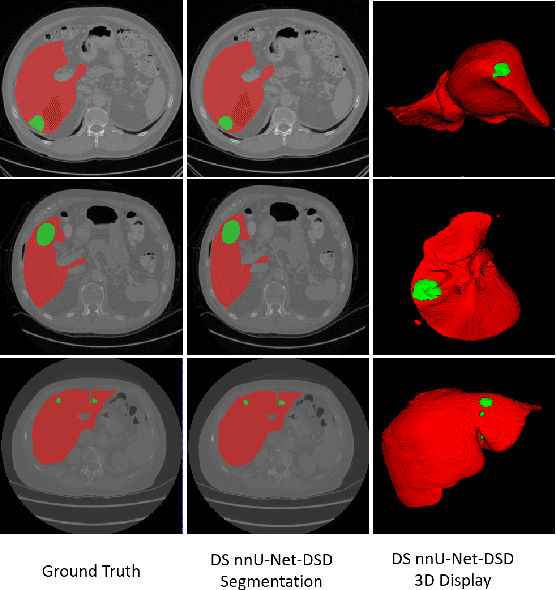Pierce KH Chow
Multi-Slice Dense-Sparse Learning for Efficient Liver and Tumor Segmentation
Aug 15, 2021


Abstract:Accurate automatic liver and tumor segmentation plays a vital role in treatment planning and disease monitoring. Recently, deep convolutional neural network (DCNNs) has obtained tremendous success in 2D and 3D medical image segmentation. However, 2D DCNNs cannot fully leverage the inter-slice information, while 3D DCNNs are computationally expensive and memory intensive. To address these issues, we first propose a novel dense-sparse training flow from a data perspective, in which, densely adjacent slices and sparsely adjacent slices are extracted as inputs for regularizing DCNNs, thereby improving the model performance. Moreover, we design a 2.5D light-weight nnU-Net from a network perspective, in which, depthwise separable convolutions are adopted to improve the efficiency. Extensive experiments on the LiTS dataset have demonstrated the superiority of the proposed method.
Multi-Instance Multi-Label Learning for Gene Mutation Prediction in Hepatocellular Carcinoma
May 08, 2020



Abstract:Gene mutation prediction in hepatocellular carcinoma (HCC) is of great diagnostic and prognostic value for personalized treatments and precision medicine. In this paper, we tackle this problem with multi-instance multi-label learning to address the difficulties on label correlations, label representations, etc. Furthermore, an effective oversampling strategy is applied for data imbalance. Experimental results have shown the superiority of the proposed approach.
Multi-Phase Cross-modal Learning for Noninvasive Gene Mutation Prediction in Hepatocellular Carcinoma
May 08, 2020



Abstract:Hepatocellular carcinoma (HCC) is the most common type of primary liver cancer and the fourth most common cause of cancer-related death worldwide. Understanding the underlying gene mutations in HCC provides great prognostic value for treatment planning and targeted therapy. Radiogenomics has revealed an association between non-invasive imaging features and molecular genomics. However, imaging feature identification is laborious and error-prone. In this paper, we propose an end-to-end deep learning framework for mutation prediction in APOB, COL11A1 and ATRX genes using multiphasic CT scans. Considering intra-tumour heterogeneity (ITH) in HCC, multi-region sampling technology is implemented to generate the dataset for experiments. Experimental results demonstrate the effectiveness of the proposed model.
 Add to Chrome
Add to Chrome Add to Firefox
Add to Firefox Add to Edge
Add to Edge